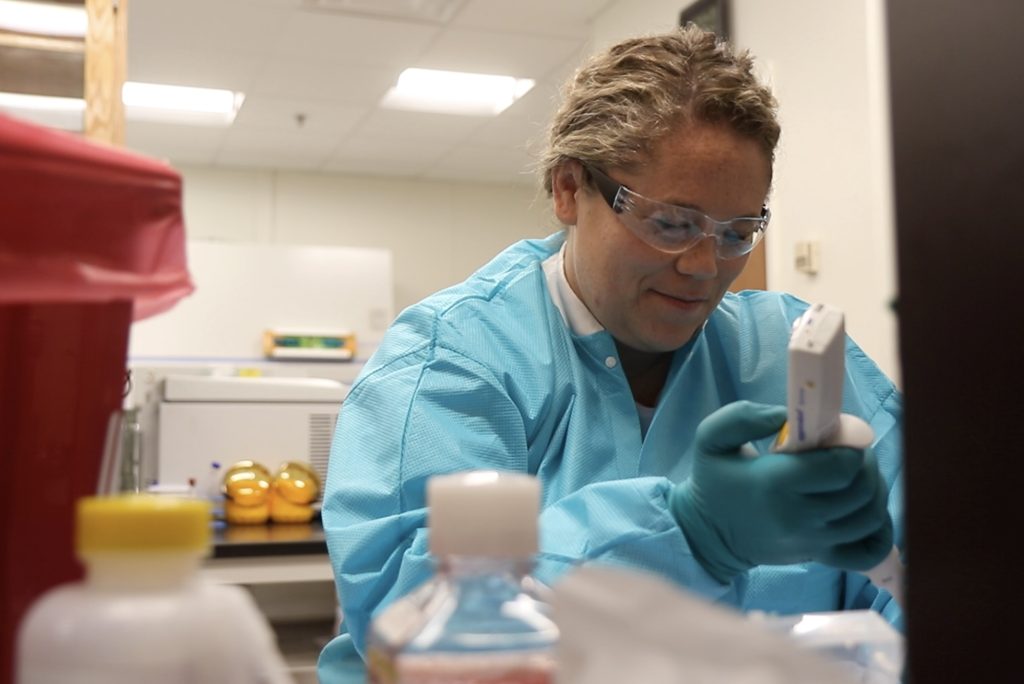Published on
Updated on

Published 3/18/2024
Story contact: Nicholas Childress, CVMMarCom@missouri.edu
Photos by Karen Clifford
Occupations that involve working with animals and wildlife, including animal control workers, veterinary professionals, bat biologists and wildlife conservationists, create a higher risk of rabies exposure. People traveling to rabies endemic areas, wildlife rehabilitators, and cavers may also be at an increased risk. Rabies expert Susan Moore, MS, PhD, associate clinical professor, section head of the Mizzou One Health-Rabies Laboratory, says people in these situations should get vaccinated and continue checking their titer.
“The rabies vaccine given for pre-exposure prophylaxis (PrEP) primes the immune system such that upon a recognized rabies exposure, the post-exposure prophylaxis (PEP) is shortened, and no rabies immunoglobulin is required, creating a quicker and less expensive PEP,” said Moore. “In addition, PrEP may provide some protection from rabies for unrecognized exposures. For those at a particularly high risk of unusual or unrecognized exposure, rabies titer testing is recommended to assure a level of circulating rabies neutralizing antibodies is present.”
The human rabies serology titer testing is an extension of the testing that has been offered through the lab. Work to develop the rabies lab began in January 2022. It was completed after all equipment and certifications were obtained. “We started with an empty laboratory,” Moore said. “We ordered equipment and supplies, then wrote standard operating procedures, and created documentation processes to veterinary and human clinical laboratory quality assurance standards for accreditation in a One Health model. Next, we followed the standard operating procedures to qualify all the equipment and reagents. Once that was completed, we validated the international gold standard assays, RFFIT and FAVN. Included was ensuring that we had proper laboratory information system tools to enable receipt and processing of samples and reporting of results.”
Animal rabies serology for pet travel started in June 2023, followed by non-export rabies serology in September 2023.
Few laboratories in the United States offer rabies titer and serology testing, which can result in longer turnaround times. For people needing quick and efficient tests for travel or work, the wait time can be problematic. Moore says that while the lab is new, the team has established a method to work efficiently. “Our group has many years of experience that has allowed us to build around our accumulated knowledge,” Moore said. “Our process allows us to have a sustainable and short turnaround time, while maintaining high quality work.”
While vaccination and titer testing recommendations can be complex, the Center for Disease Control and Prevention’s Advisory Committee on Immunization Practices updated its recommendations for rabies vaccinations in 2022. Moore says she participated in a CDC workgroup that helped develop these recommendations and emphasizes the importance of keeping up with rabies vaccination guidelines. “Those at higher risk of rabies exposure gain assurance of protection by adhering to the recommendations,” she said. “For a fatal disease, with no available treatment once symptoms appear, the importance of assurance is even greater.”
Those interested in submitting a sample for testing can find more information on the One Health-Rabies Laboratory webpage. (https://vmdl.missouri.edu/one-health-rabies/)